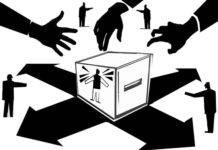What the polls show is that support for the two parties is very low by historical standards and that the swing voters are up for grabs

- How satisfied are you with the election?
The results of Dhaka Tribune’s latest national opinion poll are in and it is not good news for the government, though there are pockets of comfort to be found if you look hard enough. But, by the same token, it is not all good news for the opposition BNP, either, and it is the nuanced nature of the responses that gives me confidence that the poll is on the money.
This was the second poll the Dhaka Tribune has conducted in as many months, and I have to say that both hold up pretty well. In our first poll, published on January 3, there was something for everyone and something to upset everyone, too.
The key finding was that 77% felt that elections without the BNP would be unacceptable, but that 41% planned to vote, a number that has since been corroborated by independent observers and another poll.
The government could take satisfaction from the 74% who supported the war crimes trials, though, interestingly, a majority disagreed with the banning of Jamaat participation in the election.
Also, over 70% felt that the country was going in the wrong direction, another finding that has held up in subsequent polls.
The latest poll was equally instructive. The key finding was that 70% of the public want the government to hold fresh elections within the year (indeed 57% want them as soon as possible) and that a majority are dissatisfied with the January 5 elections.
A significant majority (63%) still indicated that the caretaker government was their preferred system for holding elections, but 56% also indicated that elections under an all-party government would be acceptable to them, which should be gratifying to the government.
Fully 78% of the respondents did not support hartals/blockades and violence as a means of protesting for fair elections, while a plurality of respondents (49% versus 34%) supported the PM’s stance that BNP needs to disassociate itself from Jamaat before talks can start.
In short, therefore, there is good and bad for both sides, and the public mood is clear.
People want fresh elections as soon as possible, at most within the year. They would prefer a caretaker government system but can live with elections under an interim government arrangement. Despite the fact that they support the BNP call for new elections, they do not want to see a return to the violence of 2013.
Almost 50% say that ending the political violence is the most important issue facing the country today, while 44% say that it is new elections. No one really cares about anything else.
The lessons for the political parties are clear.
The AL needs to fulfill its pre-election commitment to hold fresh elections as soon as practicable and not act as though it has a mandate to rule for the next five years, and the BNP must abandon the politics of violence and negotiate with the AL in good faith for new elections that would be acceptable to all.
I am leaving the most interesting finding for last.
In our January 3 poll we found that elections would be too close to call, with the BNP clocking 37% to the AL’s 36%.
In yesterday’s poll, the numbers are AL 36% versus BNP 35%.
Both results were essentially the same, within the margin of error. In short, it’s a toss-up.
Even more telling is the fact that 14.5% remain undecided and 9% declined to indicate their voting preference. In other words, there is everything to play for and any free and fair election hangs in the balance. It is anybody’s game.
What the polls show is that support for the two parties is very low by historical standards (the numbers reflected are probably close to each party’s natural base-line support) and that the swing voters are up for grabs.
The party which shows itself more responsive to the wishes of the people and more willing to compromise for the sake of democracy can expect to reap dividends on election day. This is a battle that either side can win if it decides to place its faith in the Bangladeshi people.
The PM should realise that treating the January 5 elections as a mandate offends the Bangladeshi public’s sense of fairness and justice. They know the election was no such thing.
Khaleda Zia should realise that hartals and blockades were precisely the wrong tactics and that she once again has a winning hand that only she can throw away.
Whoever figures this out and acts accordingly will win the next election, whenever it is. Unfortunately, and as ever, both sides look like they have learned nothing and want to double down on their original bet.
But they should both take note of the fact that while they each have the support of roughly one-third of the electorate, that means that they are each opposed by almost two-thirds.
Both campaign on the sole premise that they are the lesser of the two evils and that the reason to vote for them is to keep the other side out of power.
With each side’s negatives so high, this gambit may not work forever. It might not even work for another five years.
Source: Dhaka Tribune









